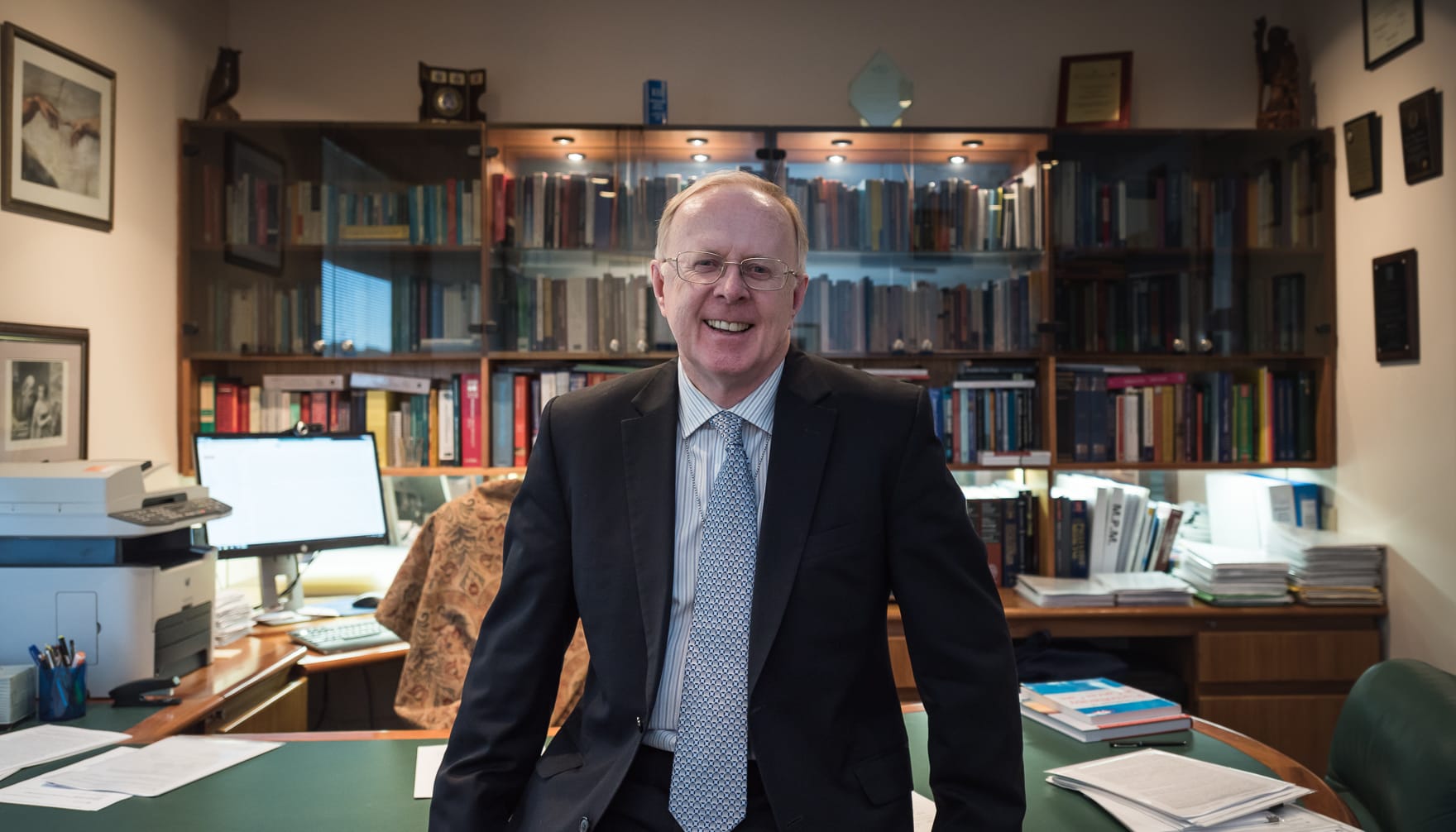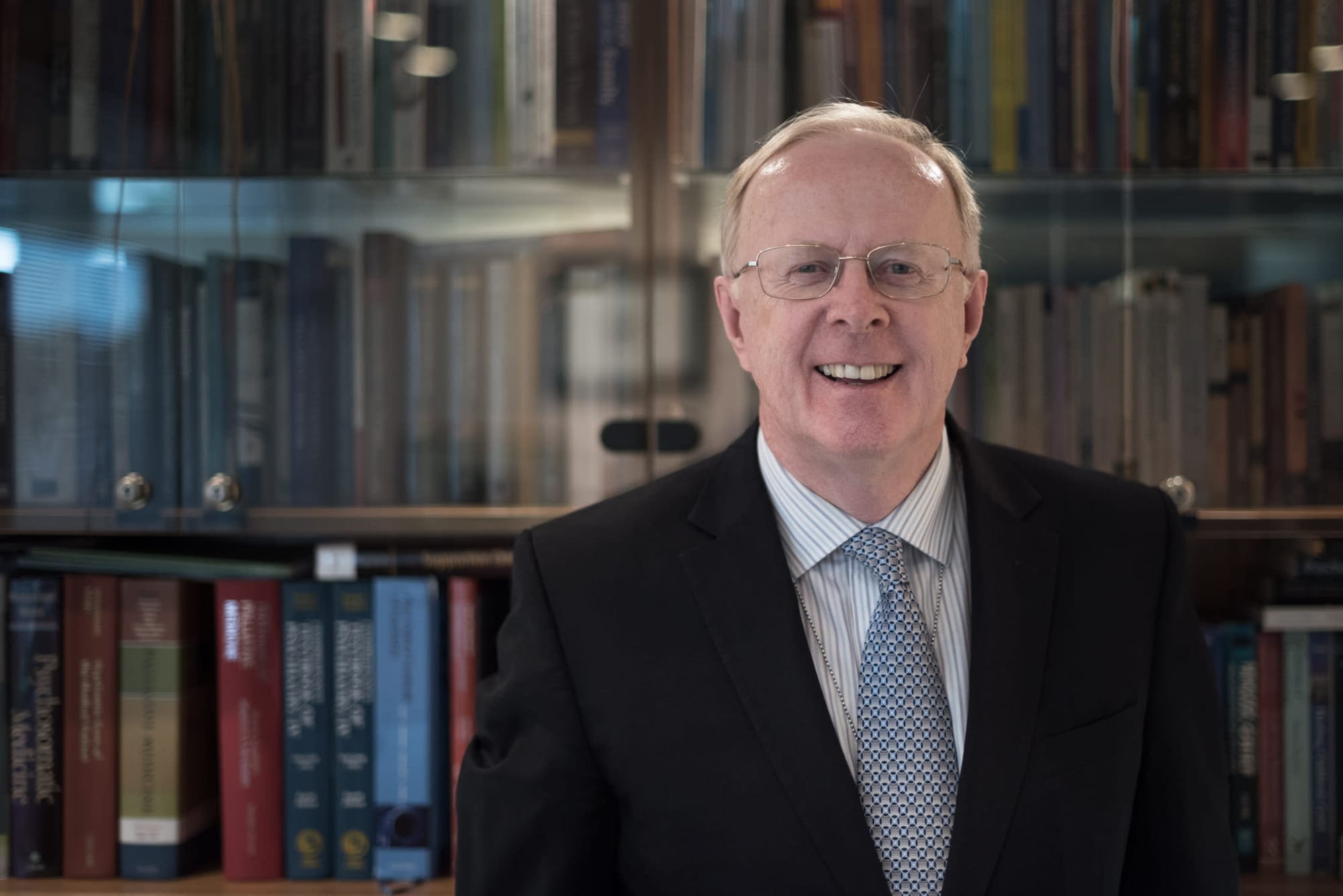
In the middle of a conversation about death and the meaning of life, Monash University’s eminent psychiatrist Professor David Kissane, AC, pauses to talk about Charles Dickens’ A Christmas Carol, a 175-year-old book.
Professor Kissane has the letters after his name now after being made a Companion of the Order of Australia for services to psychiatry. “A wonderful award,” he says. “It really surprised me.”
But back to Dickens.
“He understood the meaning of life,” Professor Kissane says. “Ebenezer Scrooge was a banker who piled up his money but had nightmares and visions of his funeral where he saw his coffin being carried, but with all the citizens turning away from it. He had a fundamental change – he became kinder and more generous, and he became happy and fulfilled. Death recognises the preciousness of life. Live it well in the moment.”
The prestigious Australia Day award specifically recognised Professor Kissane’s contribution to the fields of psycho-oncology and palliative care – how the mind works when facing terminal disease and, then, death. He’s seen this emerging area of medicine and psychiatry boom during his long career. Even the idea of counselling those facing grave illness and death was, not too long ago, taboo.

“Psycho-oncology is a relatively young discipline,” he says. “The idea is to help people look back and identify their legacy. I’ve been blessed to be able to make a contribution. In the 1960s, clinicians didn’t use the word cancer or tell people they had cancer. Families would ask them to keep it confidential and in that way not take hope away.
“Through my career truth-telling has come in, and as a consequence of people being told, the psychological challenges emerged and the discourse of psycho-oncology emerged – we call it consultation liaison psychiatry, or psychiatry with the medically ill. I found myself at the very edge of this new, emerging discipline.”
Humble beginnings
Professor Kissane started as humble Dr Kissane in 1974. He was a GP in blue-collar Dandenong, Melbourne, in his early days, for eight years. He re-trained in psychiatry at St Vincent’s Hospital and then Prince Henry’s Hospital, which led to a position at the Monash Medical Centre and, from there, another position as a senior lecturer at Monash University.
In 1996, he became the first (foundation) chair of the University of Melbourne’s palliative care unit, establishing centres for palliative care at St Vincent’s Hospital and the Peter MacCallum Cancer Institute; both were academic palliative care centres. He had National Health and Medical Research Council funding for numerous studies.
“That’s when my career took off,” he says.
He oversaw large trials of group therapy in early and advanced breast cancer, involving therapies around coping skills, fear of recurrence of the disease, and also what he calls the “existential” approach with more advanced patients. “You help people to acknowledge they are dying, and help them take stock of their life and embrace living, and to live out their life fully.”
Then he developed a model of family therapy in oncology and palliative care, spreading it out from the patient to their wider circle of loved ones. It was mainly concerned with the links between dysfunctional families and poorer health outcomes in cancer or palliative patients. “It was about correcting the dysfunctional elements in families, such as poor communication and too much conflict, and we saw that this therapy improved family life and led to less depression and a less complicated grief.”
“Psycho-oncology is a relatively young discipline,” he says. “The idea is to help people look back and identify their legacy."
In 2003 he secured an extraordinary appointment. Professor Kissane became chairman of the Department of Psychiatry and Behavioural Sciences at Memorial Sloan-Kettering Cancer Centre in New York, growing a nascent psycho-oncology program to be the biggest in the world at America’s largest and best-known comprehensive cancer centre (much like the new Victorian Comprehensive Cancer Centre in Melbourne). He developed a ‘communication’ curriculum to train cancer specialists to communicate empathetically with patients.
Professor Kissane has now written seven books and 350 publications, and was the first senior editor of the Oxford Textbook of Communication in Oncology and Palliative Care. He returned to Monash University in 2012.
One of his main areas of interest now is ‘demoralisation’ in cancer and palliative care. He wants to help define demoralisation in patients to separate it from other mental challenges and then get it into the psychiatric diagnostic system to, he says, potentially replace the currently used status of ‘adjustment disorder’ and propel it “to the heart of the diagnosis. Hopelessness, meaninglessness, pointlessness, the feeling of being trapped – this is all demoralisation,” he says.
Professor Kissane agrees that much of his life’s work to date has leaned heavily on spiritual aspects of human life. What does a life mean? What happens when we die? Have I been a good person? In this way, he’s not unlike the old-fashioned community priest, counselling those facing death.
“People have regrets, people have made mistakes in their lives, not every marriage works. It’s about helping them to put that into perspective. A lot of healing can happen,” he says. “The beauty of psycho-oncology and palliative care is that people are open to working on issues when they suddenly realise they have a fatal illness — they become much more available psychologically to do work that enables healing, and they repair things that have troubled them for many years. It’s not all doom and gloom. There’s a lot of recognition of successes and celebration of accomplishments.
“In this manner,” he says, “life triumphs over death.”





